What role did women play in the period leading up to the Revolutionary War?
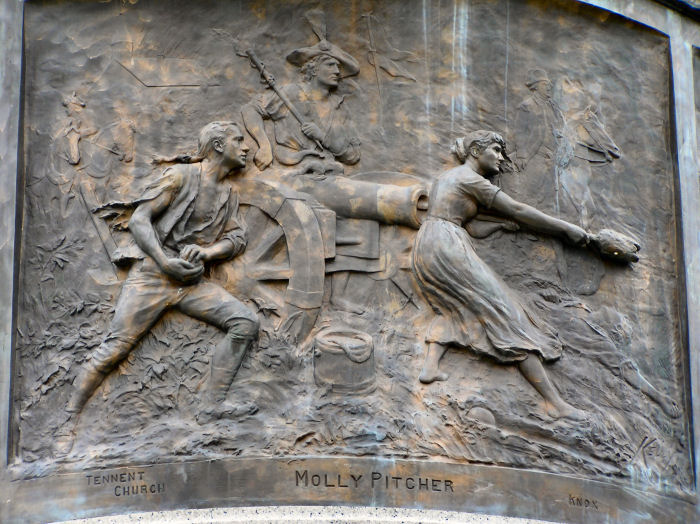
Women Likewise Fought for Independence
Image: Molly Pitcher
Monmouth Battle Monument
Monmouth County, New Jersey
When her husband was overcome with fatigue and collapsed, Molly jumped forward and helped to 'work the gun.'
Taxed past the Mother State
Relations betwixt the Thirteen Colonies and Great Britain slowly, merely steadily worsened after the cease of the Seven Years' War (1756-1763), which involved all of the major European powers and caused 900,000 to 1,400,000 deaths. The war had plunged the British government deep into debt, and the British Parliament enacted a serial of measures to increase revenue enhancement revenue from the colonies.
Parliament believed that these acts, such equally the Stamp Human action of 1765, were a legitimate means of having the colonies pay their fair share of the costs of maintaining the British Empire. Although protests led to the repeal of the Stamp and Townshend Acts, Parliament adhered to the position that it had the right to legislate for the colonies.
Many colonists viewed the acts as a violation of their rights, and they responded past forming the Continental Congress and fighting against the British armies in the Revolutionary War. However, the war would non have been able to progress as information technology did without the support of both male and female inhabitants.
Women Stepped Forwards
The significance of the contributions made by American women became increasingly apparent as the colonies struggled for their independence. The war gave some women the opportunity to demonstrate their chapters to assume responsibilities regarded equally male person. Women took charge of businesses and farms, dedicated their homes and neighborhoods, gathered intelligence for the Patriots, served every bit maids and cooks for the Continental Army; still others were nurses and soldiers on the battlefields.
Although most women were noncombatants, they were subjected to the consequences of state of war, including suffering, violence and death. The women who struggled to maintain their homesteads as fighting raged nearby confronted the threat of violence. Rape by the enemy troops was always a possibility and a source of fearfulness for women defending their homes lonely.
The Domestic Front
Ordinary domestic behaviors became charged with political significance equally women confronted the Revolution as a war that permeated all aspects of political, civil and domestic life. Back up was expressed through traditional female roles: the dwelling house, the domestic economy, and their husband's or begetter'due south businesses.
The Homespun Movement, equally a form of protest, promoted American industry, simplicity, and republic as opposed to British luxury and corruption. In 1767, shortly later Parliament passed the Townshend Act increasing duties on manufactured appurtenances, the colonies passed not-importation resolutions. Instead of purchasing clothing made of imported British materials, Patriot women relied on their ain resources, including homespun, a manifestly-weave cloth made at home. In addition to the boycott of British textiles, the Homespun Motility served the Continental Army past producing clothing and blankets for the soldiers.
During the Revolution, buying American products became a patriotic gesture. Housewives used their purchasing power to support the Patriot cause by refusing to buy British appurtenances for use in their homes. The tea boycott, for example, was a relatively mild way for a woman to back up the patriot war effort. Although the Boston Tea Party of 1773 is the well-nigh widely recognized protestation, for years prior to that Patriot women had been refusing to consume British tea as a political statement.
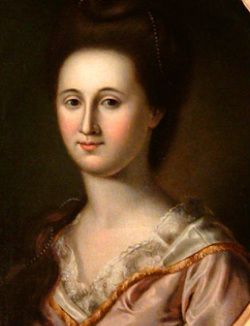
Women'due south Organizations
Women also helped the Patriot crusade through organizations such as the Ladies Clan in Philadelphia, which recognized the capacity of every woman to contribute to the war effort. The women of Philadelphia collected funds to help in the war endeavor, which Martha Washington then took directly to her husband, General George Washington. Other states subsequently followed the example prepare by founders Esther de Berdt Reed and Sarah Franklin Bache (daughter of Benjamin Franklin). In 1780, the colonies raised over $340,000 through these female-run organizations.
The purpose of the women's group in Philadelphia, equally stated in their Sentiments of an American Woman, was "to contribute as much as could depend on them, to the deliverance of their state." To practise this, the group employed volunteer women to brandish their delivery to the cause by collecting money from various donors and making other supplies, so that they visibly supported the army. Similar organizations began to spread across the colonies.
Military camp Followers
General George Washington confronted the issue of using women in the war endeavour early in the Revolution. He needed to meet the demand for medical care for his soldiers, and he wanted to find useful employment for groups of women hanging around soldiers' encampments. The medical corps was authorized to utilise one nurse for each ten sick or wounded. The nurses were paid, at first earning ii dollars per month and one daily ration, and by 1777, eight dollars per month and a daily ration.
Many women followed the Continental Ground forces, serving soldiers and officers as washerwomen, cooks, nurses, seamstresses, and occasionally as soldiers and spies. Being a military camp follower was not a favored life manner of life. Many were the wives, daughters, and mothers of soldiers – ofttimes poor, they were unable to back up themselves without their husband's income.
Every bit a army camp follower, a woman was paid a small wage and was supplied with a half ration of nutrient for herself. Their duties consisted primarily of cooking, mending, laundry, childcare, and nursing the ill. Merely their participation in such situations were ofttimes well beyond the roles dictated by 18th-century order.
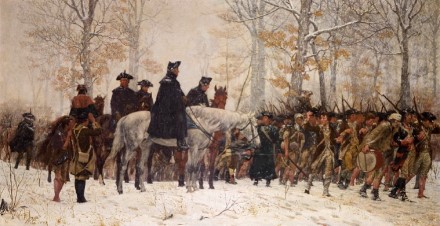
Wives of some officers visited the camps often. Martha Washington was frequently with her husband at Valley Forge, where she likewise served as nurse to injured soldiers. Unlike poorer women present in the regular army camps, the value of these well-to-do women to the ground forces was symbolic rather than practical. Their presence was a declaration that everyone made sacrifices for the revolutionary cause.
The Battlefront
Although many of the Patriot women exercised their back up for the colonial forces from their homes, others confronted the harsh realities of battle. Some women either refused to stay at domicile without men to protect them, or were economically unable to maintain their households in their husband's absenteeism.
Women joined army regiments for diverse reasons: fear of starvation, rape, loneliness, and imminent poverty – either as a final resort or to follow their husbands. There were no real physical examinations for recruits, and the mores of the fourth dimension dictated that a person'southward body be pretty much covered all the fourth dimension, then it is possible to believe no one might catch on to the deception.
Some women who were not overly feminine in appearance, especially rural women whose easily and face showed a life of physical outdoor labor, were able to sneak into the ranks. There is evidence, as in the case of Deborah Sampson, that some women were known to be such past their messmates, but because of their fighting ability and toughness were accustomed as equals.
Margaret Corbin used her own proper name and appears to have been accepted past her fellow soldiers. She served with her husband in the artillery in the Battle of Ft. Washington where they were both wounded, Margaret losing part of her arm and a breast from grapeshot.
Women Soldiers
Some women participated in the military side of the state of war. Mary Ludwig Hays, was nicknamed Molly Bullpen considering she carried h2o to American soldiers during the Battle of Monmouth in 1778, and operated his cannon after he fell in battle. Betty Zane saved a fort that was under siege by Native Americans past carrying gunpowder to replenish the depleted supply of the colonial forces.
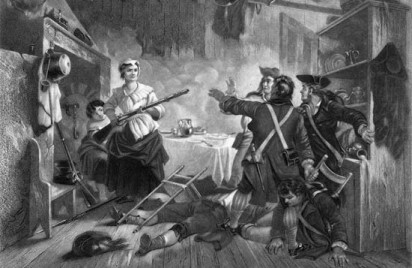
Rebecca Barrett, married woman of a Hold, Massachusetts, militia colonel, hid military stores and equipment on her subcontract, then remained at dwelling to protect her family and holding from the British. She fed the British soldiers, just refused money thrown at her, commenting that "we are commanded to feed our enemy," only their coins were "the toll of claret".
Mary Hagidorn, upon hearing the order by a Captain Hager for the women and children to retire to the cellar, said: "Captain, I shall not become to that cellar should the enemy come. I will take a spear which I can use as well as whatsoever man and help defend the fort." The captain, seeing her determination, answered, "And so accept a spear, Mary, and be set up at the pickets to repel an assail." She cheerfully obeyed.
At Pepperell, Massachusetts, following the men'southward departure for Concord, the women met, formed a female military visitor, dressed every bit men, took up artillery, and patrolled the boondocks. Prudence Cummings, elected captain, captured a Tory officer at gun point.
Other Patriot women concealed army dispatches and letters containing sensitive military data underneath their petticoats as they rode through enemy territory to deliver it. Deborah Champion, Sarah Decker, Harriet Prudence Patterson Hall, and Lydia Darragh managed to sneak of import information past the British to their American compatriots.
The ideals of liberty, equality and independence espoused by the Founding Fathers did little to meliorate women's lives. They continued to be relegated to the domicile and domestic spheres. For the most function, women bars their politics to their letters and diaries, but a few women, such as Abigail Adams and Mercy Otis Warren entered the political arena every bit public figures.
Republican Maternity
Later the war, later on having a gustatory modality of their ain independence by running farms and businesses, American women were reticent to render to the claustrophobia of the domestic sphere. Many women believed they had at least earned the right to an education equal to men'south, but they disagreed on the reasons why they should exist better educated.
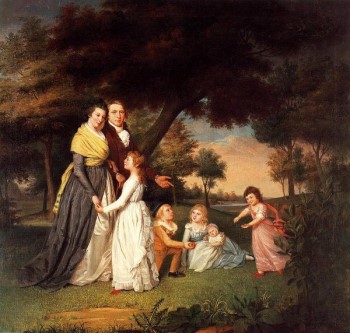
The American Revolution taught our country'due south founders that its citizens should be prepared for whatsoever possibility. They saw the education of women equally one way to prepare the new country. Still, the expansion of women'due south didactics was not meant for their own do good but to be able to mold future generations into good citizens.
Ane group believed that women had earned equal status with men in the new nation. The more radical advocates for women's rights argued that women should exist well educated, assuasive them to forego marriage if they preferred. In the end, the country reasoned that since children were first taught by their mothers, better educated women meant better educated children in a democracy that could but succeed with well-educated citizens.
Some historians believe that women's participation in the American Revolution contributed to the emerging office of Republican Motherhood, which assigned women the responsibility for the moral grooming of their sons for citizenship and led to the expansion of educational opportunities for women.
Republicanism is the American organization of government since the American Revolution. It stresses liberty, rights, and the rule of constabulary as central values, makes the people equally a whole sovereign (the will of the people), rejects inherited political power, expects citizens to be contained in their performance of borough duties, and is strongly inclined against abuse.
SOURCES
Women in the Revolutionary Era
Early on Years: American Revolution
Women in the American Revolution
Women Soldiers in the American Revolution
The Development of Women'southward Organizations
Source: https://www.womenhistoryblog.com/2009/01/womens-role-in-american-revolution.html
0 Response to "What role did women play in the period leading up to the Revolutionary War?"
Enregistrer un commentaire